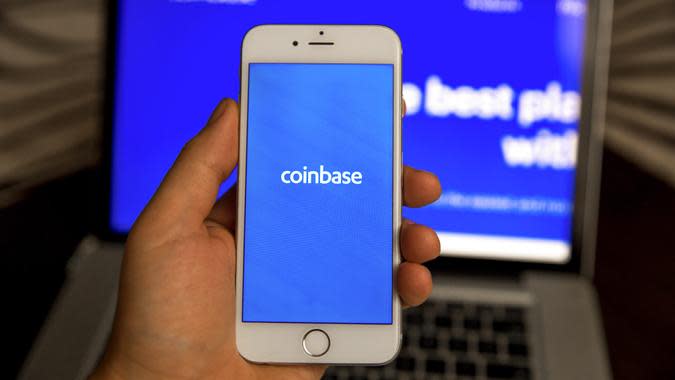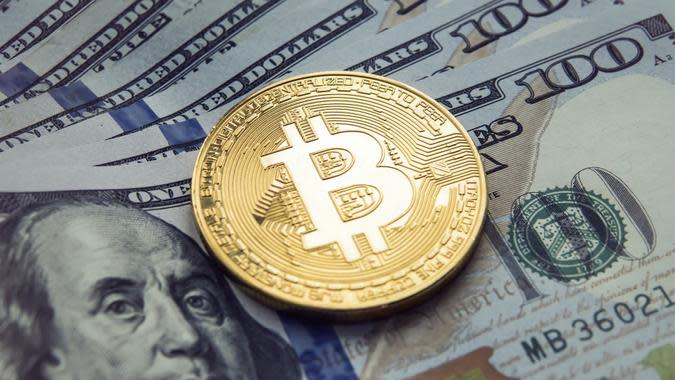6 Crypto Myths Debunked

So far, 2022 has been as unkind to digital coins as it has been to stocks. Bitcoin is down more than 37% on the year. Ethereum is down more than 41% and crypto, in general, has been in the news for all the wrong reasons lately.
Cash App Borrow: How To Borrow Money on Cash App
See: 25 Extra Grocery Costs You're Probably Forgetting About
A scary first-quarter earnings report from Coinbase, America's largest crypto exchange, has the industry and its investors in a state of panic, according to Fortune and Forbes. For many crypto naysayers, the events confirm their long-held suspicions.
In a new GOBankingRates study, a combined 40% of respondents said that they avoid crypto because they don't feel that it's regulated enough or because they don't trust the security that protects it. Another 60% don't trade crypto simply because they don't understand it.
That widespread lack of knowledge and trust is a perfect breeding ground for misinformation -- and there's no shortage of that where crypto is concerned, especially now that things are so bad.
If you're even considering jumping into the market, make sure you don't fall for the following stubborn crypto myths.

Myth: Your Investments Are Safe With Coinbase
Coinbase validated the industry and brought cryptocurrency into the mainstream when it went public and began trading on the Nasdaq. Publicly traded companies, after all, are regulated by the SEC, which is exactly the kind of federal oversight that leery mainstream investors had been holding out for all along.
On May 11, however, Coinbase's first-quarter earnings report revealed stunning losses approaching a half-billion dollars and a 19% drop in monthly users. A selloff ensued, battering Coinbase even further.
The report was followed by an announcement that stunned the industry.
If the exchange goes bankrupt, Coinbase explained, the cryptocurrencies stored in its user accounts could be subject to bankruptcy proceedings. Their owners would be treated as general unsecured creditors -- and unlike cash, crypto is not FDIC-insured.
They could, in other words, lose all of their cryptocurrencies no matter how well those cryptocurrencies performed simply because the exchange that held them went bankrupt.
Check Out: 6 Alternative Investments To Consider for Diversification in 2022

Myth: Crypto Is Unregulated
Even if Coinbase is publicly traded under the watchful eye of the SEC, the currencies that users store there are completely unregulated -- or so goes a common myth. In reality, the SEC in early May announced that it was doubling the staff that it dedicates to protecting investors in cryptocurrency markets.
According to NextAdvisor, the $1.2 trillion bipartisan infrastructure bill that President Biden signed late last year included new tax-related crypto legislation. The publication also noted that the federal government is seriously considering introducing its own digital currency and that enhanced Stablecoin regulation is all but certain in the near future. [8]

Myth: Crypto Transactions Are Anonymous
Another early turnoff for mainstream investors was bitcoin's association with criminality and the dark corners of the internet. The reason that crypto was always so popular with seedy elements of society, the myth goes, is because it's anonymous -- users can conduct secret transactions that banks, governments and law enforcement agencies are helpless to trace.
As the authorities proved when they recouped ransom payments after the Colonial Pipeline hack, that's simply not true. Crypto is converted into fiat currency -- at least briefly -- at the moment of exchange in almost all transactions, according to CNET. That leaves a paper trail, despite the fact that crypto trades aren't directly linked to identities.
Also, transactions are permanently recorded on a public blockchain and law enforcement has become much more sophisticated in the technology and techniques it uses to track illicit crypto movements.

Myth: Cryptocurrency Is Clean and Green
The process of making paper involves harvested trees and a whole lot of toxic chemicals, inks and dyes. The metal in coins -- like the gold and silver that preceded modern currency -- must be mined from the ground.
Cryptocurrency, on the other hand, exists only in a digital blockchain and is therefore environmentally sustainable, right?
That would be nice. Unfortunately, the computer power required for proof-of-work mining consumes "amounts of electricity capable of powering countries," according to Business Insider. The New Yorker reports that the world's crypto mines consume enough energy annually to power Sweden for one year and that crypto mining can be as environmentally destructive as actual mining.

Myth: Bitcoin Is Not Just an Investment, It's a Viable Currency
From the beginning of bitcoin, volatility was the name of the game -- investors endured crushing lows in pursuit of soaring highs with exciting climbs and terrifying drops in between. Enough people got rich along the way to prove that crypto can be a wise investment, but anything that can make you rich or broke in a few weeks or months makes for a lousy purchasing medium, according to NextAdvisor.
If you use bitcoin to pay for a $3 coffee, for example, but that same share of bitcoin is worth $30 a week later, you would have lost $27 on a $3 transaction.

Myth: Crypto Gains Aren't Taxed
Finally, there's a common misconception that since crypto transactions are anonymous -- again, they aren't -- that there's no way for the IRS to track gains and losses and therefore can't tax cryptocurrency investments.
Here, too, that would be nice.
The reality is that the IRS treats crypto as property. The agency taxes it just as it taxes other assets like gold and stocks. When you sell, trade, or otherwise dispose of crypto holdings, you pay taxes on the gains and you can deduct the losses, just like shares of Amazon or your favorite ETF. Similarly, tax rates depend on your income, your filing status, and the length of time you held the asset.
More From GOBankingRates
This article originally appeared on GOBankingRates.com: 6 Crypto Myths Debunked

